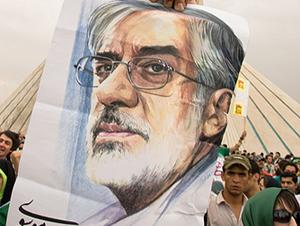The Real Mir Hossein Mousavi
(Image: flickr user Yahya Natanzi (cc:by-nd))
The following is not a full transcript; for full story, listen to audio.
Mir Hossein Mousavi is the public face of Iran’s protest movement. His supporters claim he was the real winner of the election that returned President Ahmadinejad to power. But who is Mousavi, really? Would he differ from Ahmadinejad on the issues of nuclear development or Israel?
"The Takeaway" talked to Professor Hamid Dabashi, professor of Iranian Studies at Columbia University and author of "Iran: A People Interrupted and Islamic Liberation Theology: Resisting the Empire."
Professor Dabashi says the contrast between Mousavi and the current President, Mahmoud Ahmadinejad is, "Day and night. That’s the difference. Every revolution has an idealist, high aspirations and has a demagoguery and charlatanism to it — every revolutionary movement. Mousavi represents, after 20 years of being in political isolation, those ideals and aspirations for which he fought during the revolution.
"He was the prime minister between 1980 and 1988, during the war, and after the war ended and the territorial integrity of the country was preserved, in part because of his premiership, he went into isolation. He went to painting. He’s an abstract painter and so is his wife, and he didn’t want to have anything to do with politics. I was in Iran in 1997. I wanted to see him, but he was not interested in anything contemporary or political."
Mousavi’s part in the war was far from minor, however: "Okay, he has quite a number of dead skeletons in his closet during the war, during, for example the crackdown in opposition during the 80s, during the purging of the university from operational forces when he was Prime Minister. However, this 20 years of isolation, and then you have to remember that there’s a dialectical relationship between the movement that has been unleashed, and he. In other words, the movement is reconfiguring him. He may actually rise to the occasion. This is the way that he’s been tested. The reason that people are calling him Gandhi or Nelson Mandela or Martin Luther King is precisely because if this movement is going to have a snowball chance in hell to succeed, it has to be non-violent civil disobedience. So, it is the movement that is reconfiguring Mousavi as the leader of such a movement."
According to Professor Dabashi, the current movement in Iran goes much further than the Mousavi and the election: "The time is right. The movement is not just about him. That is the entire question about the election and rigging it or not rigging it is an excuse. It’s the proverbial straw that broke the camel’s back as a result, and also it’s very unpredictable how this relationship is going to unfold as we go on.
"The fact of the matter is, the pent up anger is being unleashed in this demonstration are not just about this elections, there is civil rights, human rights and women’s rights, freedom of expression, freedom of press, etc that are pent up. Unemployment, from economic, to social to political, factors that are all coagulated in this particular movement. To what degree Mousavi can actually deliver to what this crowd wants, it remains to be seen. "
"The Takeaway" is a national morning news program, delivering the news and analysis you need to catch up, start your day, and prepare for what’s ahead. The show is a co-production of WNYC and PRI, in editorial collaboration with the BBC, The New York Times Radio, and WGBH.
